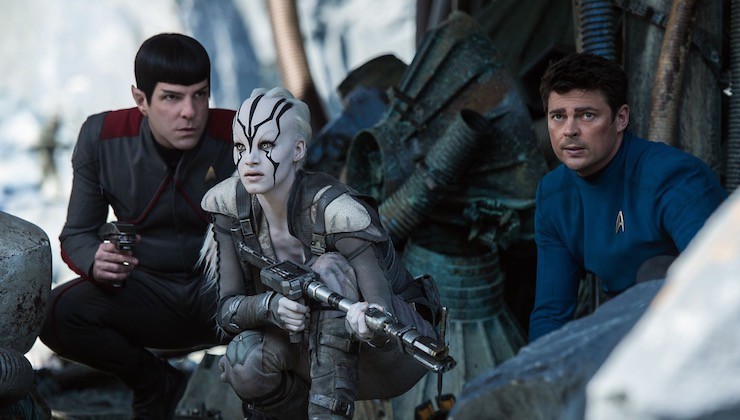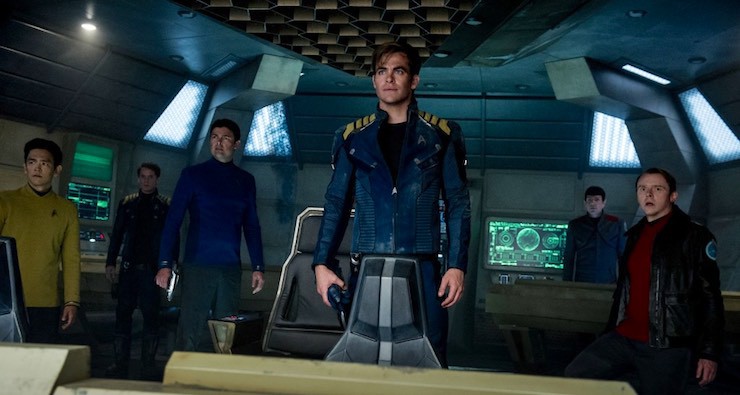Please note that this is a SPOILER-FREE REVIEW! The review that is full of spoilers will go up on Tor.com on Monday, done in the same style as my Trek Rewatches. Please everyone, keep spoilers OUT of the comments! Monday’s post will be the place to talk spoilery stuff…
As I settled into my comfortable recliner chair (best invention for movie theatres EVER) Thursday night to see Star Trek Beyond, I found myself remembering 1986. You see, 1986 was an anniversary year for Star Trek that included a movie that everyone was hoping would be better than the last one, and also the announcement of a new Trek TV series that would be distributed in a manner that was unusual and different, though not unprecedented.
Back then it was Star Trek IV: The Voyage Home, which celebrated the twentieth anniversary of Star Trek alongside an announcement of Star Trek: The Next Generation, which would debut the following year in first-run syndication, unheard of for a dramatic TV show.
Nothing changes…
This year, we’ve got Star Trek Beyond, which has a lot of people nervous for a lot of reasons, most having to do with some tumultuous behind-the-scenes stuff, starting with Bad Robot guru J.J. Abrams, director of the 2009 film and of Star Trek Into Darkness, meandering over to that other iconic franchise that starts with the word Star and continuing to Roberto Orci being set to write and direct and then, y’know, not.
And then during post-production, Anton Yelchin died in a horrible car accident, casting a pall over the anticipation for the film. (The movie is dedicated to both him and Leonard Nimoy with a couple silent, tasteful captions during the closing credits.)
Now, though, the movie is done and out. And it’s actually pretty darned good.
As with the two previous Bad Robot films, the movie looks good and has superlative acting.

The action sequences are beautifully done, the various aliens look like true aliens, and I particularly like the way director Justin Lin uses the passage of time as part of the story, going from day to night and back to day again. And in Yorktown—which is a space-based city that’s a major port of call—we get quite simply the most amazing science fictional construct in Star Trek history. Yorktown is what Deep Space 9 wanted to be but couldn’t on a weekly TV budget. Lin takes advantage of his massive FX resources to give us a magnificent cityscape that is visually stunning, refreshingly practical, and generally quite awesome—in the truest sense in that I was awed by it.
It’s not just Yorktown, either—the movie has several imaginative bits o’ technology, including the bad guy’s rather unique fleet, and the best demonstration of a universal translator any version of Star Trek has managed.
The acting remains excellent, and while John Cho’s Sulu gets comparatively little to do (his best line was given away in the trailers, sadly), the rest of the cast all gets to shine very nicely, no one more than Zachary Quinto and Karl Urban. The script wisely keeps the two of them together for most of the film, and it’s magnificent. Urban in particular has been poorly served by the Bad Robot films, channeling DeForest Kelley perfectly in every scene he’s in, but never getting the chance to shine. He gets it here, and Quinto matches him point for point. (The “horseshit” exchange is one of the best parts of the movie.)
Chris Pine, though, is the star of the show in every sense. The punk kid of the last two movies who would have made more sense in the brig than the captain’s chair has matured, and we’re finally starting to see the Jim Kirk that William Shatner played five decades ago. Best of all, he only gets beat up once this time!
Just like Into Darkness, we’ve got one of the finest British actors drawing breath as the bad guy. Idris Elba’s Krall doesn’t blow the doors off as much as Benedict Cumberbatch’s Khan did, but he brings a level of anguish and pain to the role that makes him much more than the cardboard bad guy he’s mostly written as, his actions not explained until way too late in the film. (More on that Monday.)
There are welcome cameos by Greg Grunberg and Shohreh Aghdashloo as Yorktown crew, nice performances in small but potent roles by Lydia Wilson and Melissa Roxburgh, and a superlative supporting turn by Sofia Boutella as Jaylah. Indeed, Boutella provides a character very much like Saavik in The Wrath of Khan (or Ro Laren in The Next Generation), a new player who challenges and helps our heroes, and provides a nice little outsider zing to the comfortable crew.

However, nice visuals and good acting are old hat for Bad Robot Trek films, but what’s been missing is a script that isn’t dumber than a box of hammers. Well, encased construction tools can take heart in the fact that they get the top dumb spot once again, as the script by Simon Pegg and Doug Jung is actually good!
Not great, mind you. The character arcs are fairly simplistic, and really only there for Kirk and Spock (and Krall), and the plot is fairly straightforward. But sometimes straightforward is good. Besides, after some of the logic howlers of the last two (why did Khan go to Kronos? why did Kirk get the captaincy when he was only out of the Academy for five minutes? why did they need Khan’s magic blood when they had 72 other Augments? what the ever-loving hell is red matter, anyhow?) this one was refreshingly free of those. Every action taken followed logically and sensibly from the previous action. Kirk is still the big hero, with Spock, McCoy, and Scotty right behind him, and Sulu, Uhura, and Chekov doing their bit as well (as does Jaylah).
Best of all, though, is that this is a Star Trek story. At its heart, Trek has always been about how humanity can progress. It started with a simple casting decision—having a Scottish man, a black woman, an Asian man, and an alien, and later a Russian man, all working alongside the two white American dudes, was a radical notion in 1966. It proceeded to give us a show where the day wasn’t always saved by having the bigger gun, but by being smart and by being compassionate. Star Trek has always been about hope, first and foremost, starting with that very casting decision showing that humans of different nations had put those hostilities aside, and now were one united Earth.
In this movie, it’s about the unity of the crew, and showing what they can accomplish together.
There are other ways that it’s a Star Trek story, of course, from the (many) nods to Star Trek: Enterprise to the cutesy references to “Tuvix” and “Who Mourns for Adonais?” to several old reliables of the franchise in general and the original series in particular: Spock-McCoy banter, Kirk and McCoy drinking, Scotty being a miracle worker, Uhura being defiant in the face of a nasty bad guy, Kirk being clever and thinking on his feet, Chekov insisting that Scotch was invented in Russia, and so on. Plus, thanks to things like Yorktown, it has the futurism that was a hallmark of Gene Roddenberry’s original vision.
Star Trek hasn’t always been served well by being a film franchise. Any list of the best Trek stories would be very unlikely to include any of the movies. Even the best of the dozen previous films don’t hold up in comparison to the best episodes of the series. But when considered alongside the others, Beyond is the first of the Bad Robot films that can be spoken of legitimately in the same breath as The Wrath of Khan and The Voyage Home and First Contact. And that’s no small feat.
Keith R.A. DeCandido has been rewatching several Star Trek series for Tor.com since 2011, including The Next Generation and Deep Space Nine. He’s currently rewatching the original and animated series every Tuesday on this site (look for “Plato’s Stepchildren” on Tuesday), and has also covered the Stargate franchise and the 1966 Batman. He’s also written dozens of Trek novels, short stories, and comic books, most recently The Klingon Art of War, and the rest of his fiction bibliography spans more than two decades and over 50 novels. Read his blog, and follow him on Facebook, Twitter, and/or Instagram.










